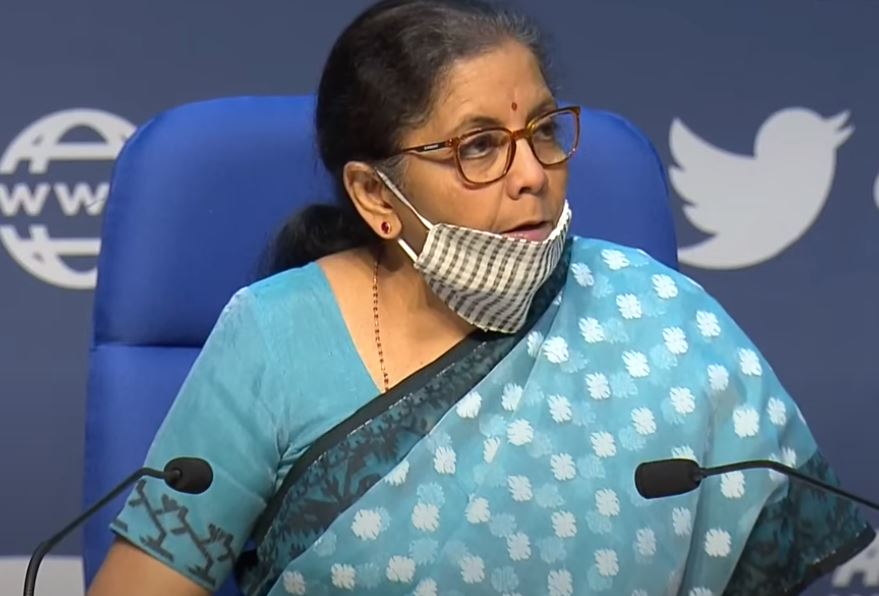
Following up on the Prime Minister’s speech, the Finance Minister, joined by MoS Anurag Thakur and officials, detailed the government’s approach in reviving the coronavirus-affected economy and achieving the Prime Minister’s vision of ‘Atmanirbhar Bharat.’
The Prime Minister’s vision of a self-reliant India was inclusive of various inputs received from multiple consultations at several levels, said the Finance Minister, stressing that the government was both ‘responsive’ and ‘sensitive.’
The team comprising the Finance Minister Nirmala Sitharaman, MoS Anurag Thakur, and officials will brief the media on each sector that is to go through the reforms over the next few days.
A reminder of earlier reforms
While making it a point to remind that several schemes that were introduced in the last six years have been for the benefit of the poor, Ms. Sitharaman said that a massive cleanup of Public Sector Banks and their recapitalisation, liberalisation for foreign direct investment, the GST reforms and the privatisations of airports were intended to strengthen the economy. The cleanup involved in coal mining and generation of solar power resulted in India being a power surplus country said the Finance Minister.
The Direct Benefit Transfer, Micro Insurance, PM Awas Yojana, PM Ujjwala Yojana, Swacch Bharath Abhiyan, and Ayushman Bharat – all these schemes were reform-driven to help the poor while the PM Fasal Bima and PM Kisan Yojana (Pradhan Mantri Kisan Samman Nidhi) schemes had been implemented specifically for the benefit of the farmers, she said.
Both the Finance Minister and the MoS Finance provided numbers to show the implementation of the said schemes.
What was today about?
Today’s sector in focus was Business and involved the MSME (Micro, Small and Medium Enterprises), EPF (Employees’ Provident Fund), NBFC (Non-Banking Financial Company), MFI (Microfinance), Discoms (Distribution Companies supplying electricity), and Real Estate.
MSME redefined & to get collateral free loans
MSME definition was being changed in favour of the MSME, said the Finance Minister. The MSME can grow without being excluded from the scope of the classification.
A Micro-Enterprise, which was limited by an investment of 25 lakh Rupees can now have investments up to 1 Crore and an annual turnover of up to 5 Crores.
A Small Enterprise can have an investment of up to 10 crores and a turnover of up to 50 crores.
A Medium Enterprise is eligible for an investment of up to 20 crores and can have a turnover of 100 crore rupees without being declassified as MSME.
Manufacturing and Service MSME will also be defined similarly, said Ms. Sitharaman.
Collateral free loans up to 3 lakh crores are set aside for the MSME. This was a much-needed boost for the sector, given that a majority of businesses have struggled with a loss of revenue.
Credit is guaranteed both on principle and the interest until 31st October 2020 and will benefit 45 lakh units. The loans will also have a 12-month moratorium.
The government will also provide Rs 20,000 crores as subordinate debt for the MSME that are under financial duress.
Non-Banking Financial Institutions get a liquidity boost
Non-Banking Financial Companies and Microfinance companies will get a boost of 30,000 crore rupees. A partial credit guarantee worth 45,000 crores is also announced.
Real Estate sector and the Contractors
The timelines on the Real estate project registration certificates will now be revised. The process will be automatic, and registration and completion dates would also be extended by six months.
A six-month extension has also been allowed to the Contractors.
TDS and TCS rates have been cut by 25 percent.
No more ‘Global Tenders’ for projects worth up to Rs 200 crore
Towards self-reliance and to make in India, global tenders will no longer be permitted for works worth less than 200 crore rupees.
Income-tax returns can be filed ‘a bit later’
The due date to file the income-tax returns for the Financial year 2019-20 is now extended by three months.
Also, the Employee Provident Fund contributions have been reduced marginally.
The DISCOMs get a much needed boost
Focusing mostly on the reforms, the 90,000 crore stimulus allotted to the DISCOMs was much needed for the distribution companies which were defaulting on payments on their power purchases.
In most cases, the defaults are owing to the power subsidies provided by the state governments.
How hurt is the economy with the coronavirus situation?
Responding to a question about the losses sustained by the economy in the current crisis, the Finance Minister said that she wouldn’t be able to provide an estimate while the situation is ongoing.
You may want to read about what Prime Minister Narendra Modi said about ‘Atmanirbhar Bharat’ in his speech to the nation on May 12.